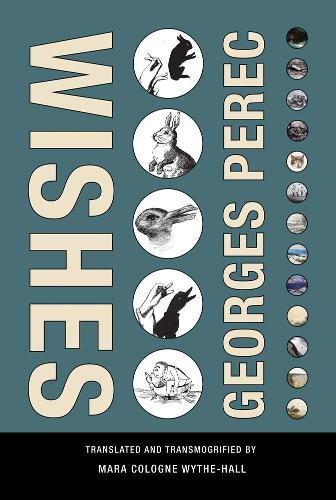Readings Newsletter
Become a Readings Member to make your shopping experience even easier.
Sign in or sign up for free!
You’re not far away from qualifying for FREE standard shipping within Australia
You’ve qualified for FREE standard shipping within Australia
The cart is loading…






Twelve years of Georges Perec’s annual pamphlets filled with homophonic wordplay
In the beginning was the pun, Samuel Beckett once wrote. And so it was that Georges Perec brought the good word to his friends and acquaintances on a yearly basis, as an expression of his best wishes for the New Year. Wishes gathers together these ten pamphlets of homophonic wordplay that Perec sent out from 1970 until his death in 1982, printed at his own expense in limited quantities. This paean to the pun consists of a series of short prose pieces, each concluding with a list of the everyday bits of language lying at their root. English proverbs, Latin phrases, the names of musicians, filmmakers, novelists and book titles are all fodder for Perec’s homophonic translations: John Coltrane turns into an anecdote about a wanderer with a severe ring around the collar; Antonioni’s first movie transforms into a prophecy of a murderous holiday; the phrase All’s well that ends well becomes a pregnant cow named Alice hailed by a drunk Satan; and Maurice Ravel proves to be a warning against corpses with a predilection for root vegetables.
These texts and their marriage of sound to meaning present a challenge to any translation, and bring into stark relief the choices translators are often forced to make. This English edition sidesteps such choices, offering two alternate translations: a traditional one focused on the literal content of Perec’s texts, and another focused on their formal phonological play.
Georges Perec (1936-82) was a French novelist, essayist and filmmaker whose linguistic talents ranged from fiction to crossword puzzles to palindromes. Winner of the prix Renaudot in 1965 for his first novel, Things, and the prix Medicis in 1978 for his most acclaimed novel, Life A User’s Manual, Perec was also a member of Oulipo.
$9.00 standard shipping within Australia
FREE standard shipping within Australia for orders over $100.00
Express & International shipping calculated at checkout
Twelve years of Georges Perec’s annual pamphlets filled with homophonic wordplay
In the beginning was the pun, Samuel Beckett once wrote. And so it was that Georges Perec brought the good word to his friends and acquaintances on a yearly basis, as an expression of his best wishes for the New Year. Wishes gathers together these ten pamphlets of homophonic wordplay that Perec sent out from 1970 until his death in 1982, printed at his own expense in limited quantities. This paean to the pun consists of a series of short prose pieces, each concluding with a list of the everyday bits of language lying at their root. English proverbs, Latin phrases, the names of musicians, filmmakers, novelists and book titles are all fodder for Perec’s homophonic translations: John Coltrane turns into an anecdote about a wanderer with a severe ring around the collar; Antonioni’s first movie transforms into a prophecy of a murderous holiday; the phrase All’s well that ends well becomes a pregnant cow named Alice hailed by a drunk Satan; and Maurice Ravel proves to be a warning against corpses with a predilection for root vegetables.
These texts and their marriage of sound to meaning present a challenge to any translation, and bring into stark relief the choices translators are often forced to make. This English edition sidesteps such choices, offering two alternate translations: a traditional one focused on the literal content of Perec’s texts, and another focused on their formal phonological play.
Georges Perec (1936-82) was a French novelist, essayist and filmmaker whose linguistic talents ranged from fiction to crossword puzzles to palindromes. Winner of the prix Renaudot in 1965 for his first novel, Things, and the prix Medicis in 1978 for his most acclaimed novel, Life A User’s Manual, Perec was also a member of Oulipo.